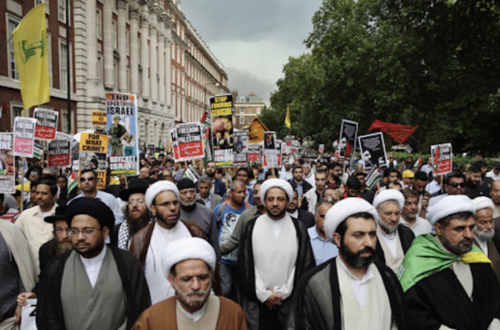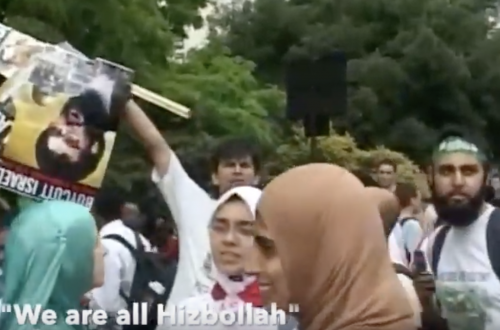This is a guest post by Fariba Amini
A few days ago, I attended the memorial service for Shapour Bakhtiar and Soroush Katibeh at the famous cemetery of Montparnasse in Paris.
On August 6, 1991, Dr Bakhtiar, whose government lasted 37 days after the Iranian Revolution, and his assistant Mr. Katibeh were murdered in Paris ( having their throats slashed) by agents of the Islamic Republic of Iran. This was 19 years ago. Only three months ago, one of his murderers,, Ali Vakili Rad,, was released from jail In France, supposedly having terminated his jail term. In reality however, he was exchanged for Clothilde Reiss, the French student who had been arrested in the summer of 2009 and held in Evin accused of spying for the French government. We know how that works, the IRI slams foreigners or Iranians with the spy label and no one can prove his/her innocence since there is no due process in Iran.
Justice is a one way street under the Islamic Republic of Iran.
In the meantime, Vakili Rad, the killer of Bakhtiar, was given a hero’s welcome in Tehran, showered with flowers around his neck. He told the news media that he did not regret his action.
In 1998, Dariush and Parvaneh Forouhar, an elderly couple who were both opponents of the Shah’s regime and that of the Islamic regime, were stabbed to death in their home in Tehran. A few days later, the bodies of members of the Writers Association of Iran were found strangled to death, in what came to be known as the serial murders of autumn 1998. A few rogue agents of the Ministry of Intelligence were arrested under the Khatami government. There was a trial but none of the accused was sentenced or given jail terms. In fact, when the daughter of the Forouhars, Parastou and the family’s lawyer asked to see the file on her parents, the request was denied.
In the summer of 1988, mass executions took place in several prisons including Evin. The families were only notified after the fact. They neither saw their loved ones nor had a chance to hire lawyers or have their day in court. As customary, the judicial system in Iran brands everyone with “working against national security.” This is a broad accusation that can embody many things. In the case of prisoners of the summer of 1988, they were labeled “mohareb ba khoda” which means enmity towards God. The sentence was swift as was the execution of nearly 5000 political prisoners according to a report by Amnesty International.
In 2005, I had a chance to meet and interview Mr. Abbas Amir Entezam, the longest held political prisoner of Iran and former deputy PM under the provisional government of Mehdi Bazargan when I visited him at his home in Tehran. After twenty some years of imprisonment, he had been given a leave of absence. Mr. Entezam told me that he had witnessed prison cells being full and then emptied out. He told me he still had nightmares about those dark times in prison. He was himself accused of espionage for the US; a charge he has vehemently denied then and still denies. No real evidence was ever presented in the court of “law” of the IRI against him. Years later, one of the judges presiding over this trial sent him a letter apologizing for the unfair accusation.
Since the 2009 elections, the number of people detained or even killed, has risen to an alarming number. Both the detainees and their lawyers are handed down sentences, in some cases even death, while the killers are set free or are immune from any form of prosecution. Under the Islamic Republic of Iran, for the victim and their families, justice will never be served.
A few weeks ago, a 43 year old woman, Sakkineh Mohammad Ashtiani, was accused of adultery and sentenced to death. She has denied the charges and in an interview with the Guardian accused the Iranian government of lying. After an international outcry, her sentence was reduced to stoning. In 2008, eleven people, nine of them women, were sentenced to death by stoning. The number is staggering. Iran is the only country in the world that practices stoning to execute those who commit adultery. Article 102 of the Penal code, states that married offenders (adulterers) are liable to stoning regardless of their gender, but the method laid down for a man stipulates he be buried up to his waist, and a woman up to her neck.
According to a report by AI, “The majority of those sentenced to death by stoning are women. Women are not treated equally with men under the law and by courts, and they are also particularly vulnerable to unfair trials because their higher illiteracy rate makes them more likely to sign confessions to crimes they did not commit.”
Whereas the judicial law of Iran, ratified by the Parliament constitutes that three witnesses are needed before a man or a woman is put to death, this has rarely been practiced in Iran since the Revolution. Whether sentenced as a common criminal or a political prisoner, the judicial system is screwed up all the way from top to bottom.
In prison, Iran’s famous poet, Saeid Soltanpour, who had been in jail during the Shah and later taken from his wedding ceremony in 1979 to the gallows, asked a cell mate before his execution, “what is happening to my country?”
I often ask myself the same thing: What is happening to my country? What happened to justice?


